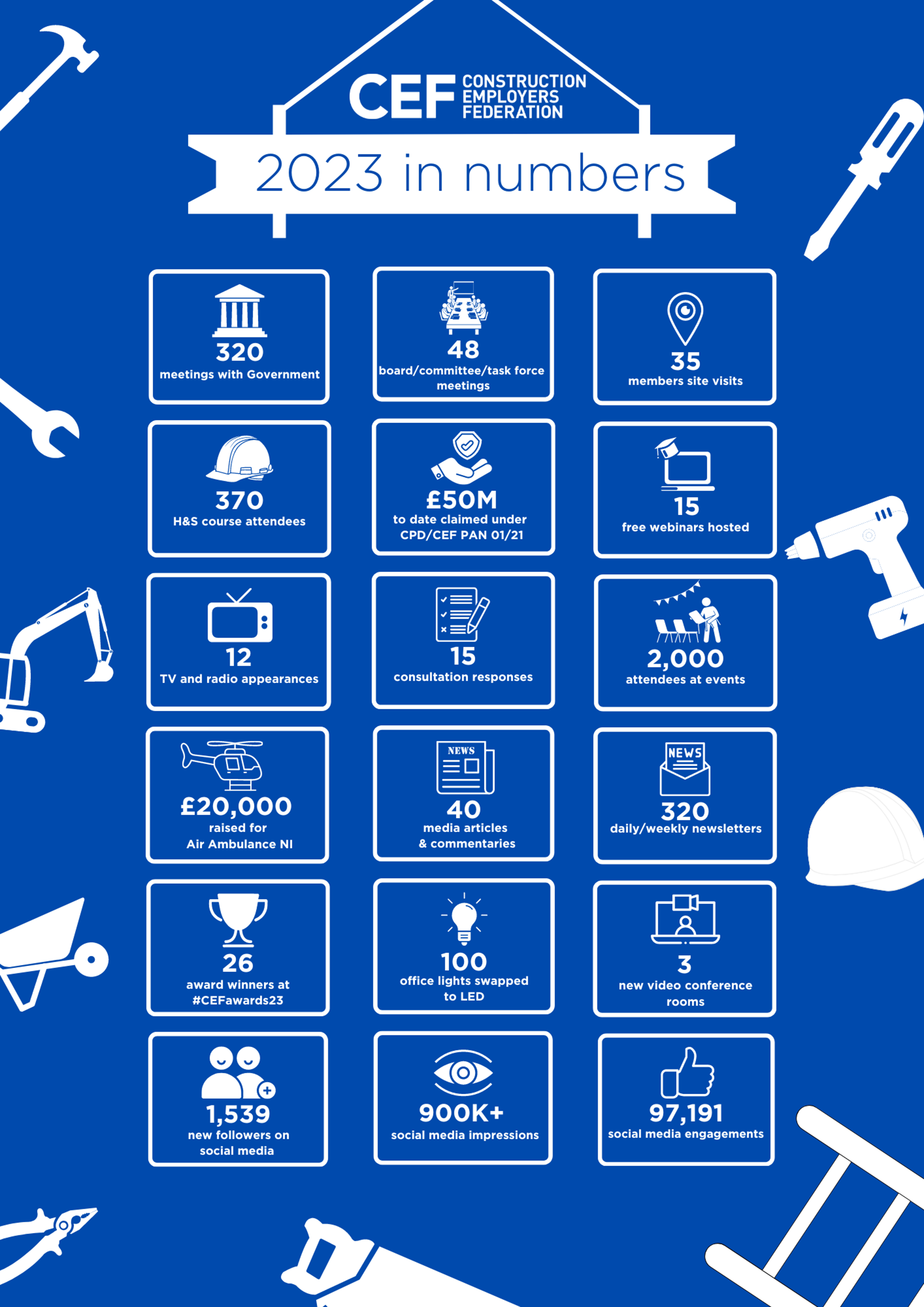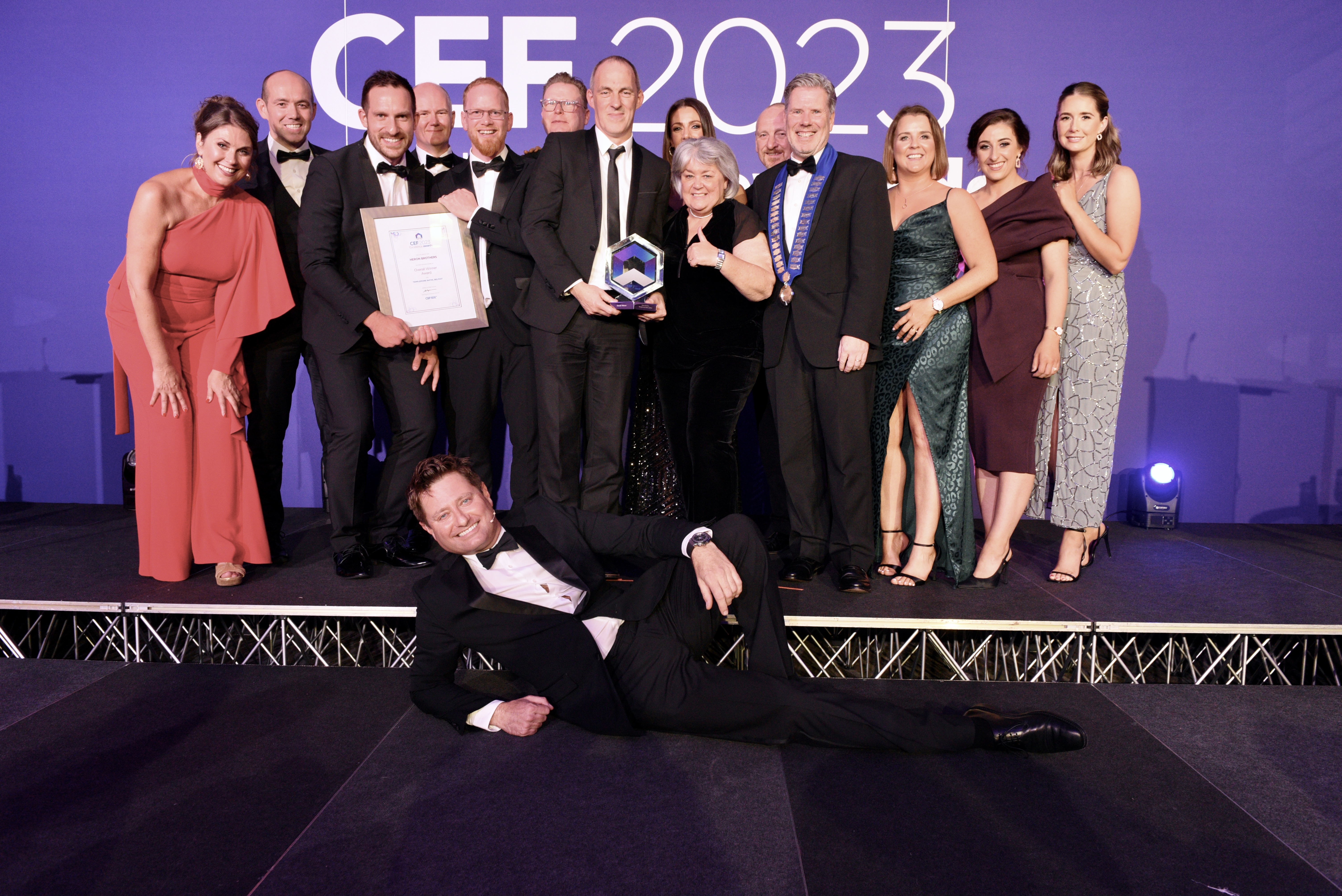Construction outlook: 2023 in review and future prospects
13 December 2023 Business Environment
CEF Chief Executive Mark Spence shares his thoughts on a challenging 2023 and looks ahead to next year's prospects.
This past year has seen a welcome, gradual easing of the inflationary and material shortage pressures that blighted the sector during 2022.
However, even as inflationary pressures have receded, they remain significantly higher than where they were in early 2021. This continues to have an impact – for instance on how far existing public sector budgets can go as well as, increasingly, on the new build housing market both from the point of view of completions and affordability – and has therefore remained a major focus of our work throughout 2023.
In that context, the importance of a clear pipeline of works has remained clear. That is why we have continued to work closely with all Government clients and look forward to furthering those links in 2024 as we seek to identify the best models of procurement for different types of projects and contracts.
We have also welcomed a number of specific engagements with clients on their plans including CPD, the Department’s of Health, Education and Infrastructure, NIHE, the various bodies involved in the Belfast Region City Deal and Ireland’s National Transport Authority.
In the continued absence of the NI Executive, a number of industry-critical consultations were taken forward by government departments.
Among these, we began the year by engaging with members to respond to a mid-term review of the social value Procurement Policy Note that was implemented in 2021/22. This engagement has led to a welcome pause by government in increasing the minimum of 10% of the total award criteria to 20% as was due to happen in June. This has allowed us to lead more detailed engagement with SIB on how the PPN can better reflect the challenges and opportunities that social value in public contracts brings.
CEF's Impact in 2023

Local new build regs
On housing, recent focus centered on forthcoming local building regulations for new builds. The next phase, estimated for late 2024, has been the subject of recent consultation on four key aspects: possible acceleration of the restriction on conventional oil heating for new dwellings in NI; potential impact of revised guidance timing on homebuilders; assessment of proposals affecting homebuilding costs amidst economic conditions and housing shortages; and integration of changes, especially PV and EV charging infrastructure, ensuring feasible grid connections.
This consultation came shortly after one on the long-awaited and welcome fire safety changes which have already been implemented in GB with implementation of the new rules – all new buildings which contain flats and are more than 11m above ground level would require sprinkler systems – likely by the middle part of 2024.
In addition, and linked to the urgent need to accelerate our move toward net zero, we responded positively to a DAERA consultation on Northern Ireland’s 2030 & 2040 Emissions Reduction Targets & First Three Carbon Budgets and are following this up with more detailed work with the Department’s for Infrastructure and Education.
At the national level, our focus has primarily been on the recently passed Procurement Act and the implementation of the Building Safety Act. On the former, much of the coming year will see the passing of secondary legislation that will give effect to the Act’s commencement by the end of 2024. The extent to which, however, the Act will be different from the existing Public Contracts Regulations remains to be seen. On the latter, and aside from the gradual rolling out of the New Homes Quality Code in NI, much of the Act has yet to be implemented in NI. It is expected that this will gradually change in the months ahead and will, in all likelihood, be a significant point of focus for the sector.
Celebrating excellence
In the context of the challenges the sector has faced, it was great to once again hold our CEF Excellence Awards this year. This year’s Awards, the 24th edition since they commenced in 1999, represented the biggest to date with some 26 Award winners on the evening and nearly 600 in attendance at the Crowne Plaza in Belfast.

Acting as the industry’s premier event in NI, it is crucial that the excellent projects and people in the sector continue to be celebrated, and we are already planning a bigger event for our 25th anniversary next year!
As we look to 2024, it is undoubted that there will remain some level of uncertainty in the market. The absence of the NI Executive and impending general elections in the UK and Ireland contribute to this.
Our focus for the year ahead begins with government consultations on revenue raising which, for us, will focus on growing the public sector’s capital budget in ways which are sustainable and, largely, fall within the remit of powers which have already been devolved to the NI Assembly.
Notwithstanding some of the difficult decisions that these consultations may lead to, what continues to give me confidence is the ability of our industry to adapt and thrive in whatever circumstances they are placed. Over this past year, we have visited dozens of members’ sites right across NI and have seen everything from wastewater treatment works to new build housing developments to major education projects. We will continue this approach into 2024, seeking to achieve positive change for our members to enable them to grow further and meet their undoubted potential.
That will, undoubtedly, require a strong partnership with a renewed and reformed devolved government – and it is vital that that happens in short order.